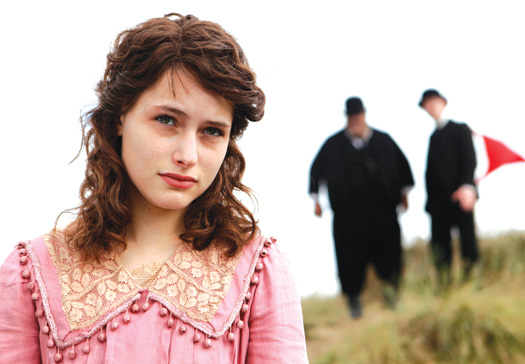Detecting pastiche in Bruno Dumont’s Slack Bay
A slapstick crime story set in 1910 at an end-of-the-world stretch of coast in northern France
Friday, 16th June 2017 — By Dan Carrier

Raph (Billie), and Inspectors Machin and Malfoy (Didier Després and Cyril Rigaux) in Slack Bay
SLACK BAY
Directed by Bruno Dumont
Certificate 15
☆☆
This is a Marmite of a movie – though its fans will have to be real aficionados of French comic cinema to find much joy in this bizarre offering.
Let’s start with the pluses: it’s shot nicely, with some clever use of the camera, and the cast are clearly game for the ludicrous slapstick their characters are shoe-horned into. But this cannot make up for the fact that it feels far too much like a pastiche, an am-dram weekend workshop that happens to have been captured by someone who is skilled at camerawork, if not direction of the players.
It is the summer of 1910 and two police detectives, Machin and Malfoy (Didier Després and Cyril Rigaux), appear at Slack Bay, an end-of-the-world-type stretch of coast in northern France to try and crack a case of multiple disappearances of tourists.
The focus of their investigations centre on a family called the Bruforts: the father (Thierry Lavieville), known as The Eternal, runs a ferry service with his son Ma Loute (Brandon Lavieville).
Meanwhile, a family of upper-class holidaymakers who return each year to their summer abode have arrived. Called the van Peteghems, they suffer from generations of in-breeding – a cranky, eccentric bunch who appear to be laden down with secrets.
So that’s the background – but it’s no plot spoiler to say none of these early pointers to a followable story unfolds.
Instead, it becomes a showcase for a frankly bizarre parody that underlines British assumptions of why French film can be weird and unapproachable.
Director Bruno Dumont says he references Max Linder, a French comic who poked fun at the French middle-classes and their behaviour. He also draws on French burlesque comedy, and references Laurel and Hardy (the police officers are clearly modelled on the pair).
This film is grotesque in its application, odd in its appearance, and unfathomable as a story. Perhaps that’s what Dumont was setting out to do – personally, such aims, if correct, were lost in translation and with such a gifted team of cinematographers and a good cast, it feels like a wasted opportunity.
Maybe that shows a lack of knowledge of the genre, but even if this is the case, it’s a struggle to care what happens to any of the characters, or those who disappeared, by the time the credits roll.